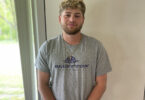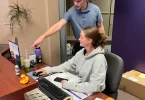With the recent outbreak of COVID-19, in-person classes have been suspended. Many classes have moved online and will take place using video conferencing or other alternatives. Residence halls are scheduled to close on March 18. How are classes that are based around physical presence impacted by this change in schedule?
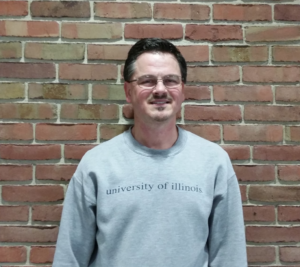
Professor of Mathematics and Chair of the Mathematical and Natural Sciences Department Steve Harnish. Photo by Nathan Heinze.
“I do not have a complete answer at this time,” said Professor of Mathematics and Chair of the Mathematical and Natural Sciences Department Steve Harnish. “After campus closes Wednesday, appropriate lab adjustments and plans will be made by science faculty and communicated to their students.”
Professor of Chemistry Dan Berger elaborated on how the virus and campus closure is impacting his classes, and how he is responding to the cancellation of in-person classes.

Professor of Chemistry Dan Berger. Photo by Nathan Heinze.
“Two of my classes are lecture format… in fact, one of them is designed to be delivered entirely online, so it’s hardly any break at all,” said Berger. “The lab class took a bit of thought.”
Berger said he plans to hold substitute activities for his lab classes, including performing one lab himself and providing the resulting data to the students.
“The larger ensembles will not meet until we get the ‘all clear,’ ” said Associate Professor of Music Roy Couch. “Students that take those courses for credit, we’re just going to assess them on up until this point.”
Couch said due to the closure, video conferences will be held to give feedback.
“It’s not quite the same, but we do want to keep them going on that,” said Couch.
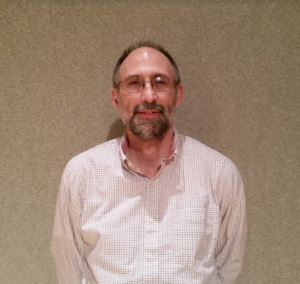
Music Department Operations Coordinator Merv Schrock. Photo by Nathan Heinze.
Music Department Operations Coordinator Merv Schrock corroborated Couch’s statements on how the music department is moving forward in the wake of the virus.
“We as a department are now trying to figure out what to do about the performances students who need to graduate,” said Schrock. “The seniors need to do a recital that is a major part of their grade. We, the music department, have a lot of decisions to make.”
As for theatre performance classes, Chair of the Art, Communication, and Theatre Department Melissa Friesen said the classes will simply be modified for an online setting.
“This particular semester, the only theatre course I’m teaching is Theater for Social Change,” said Friesen. “So I’m having to think really creatively on how to transition that to distance learning.”
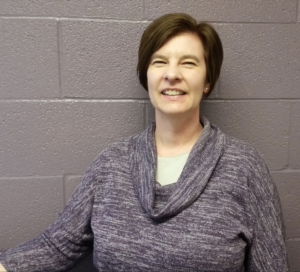
Chair of the Art, Communication, and Theatre Department Melissa Friesen. Photo by Nathan Heinze.
Friesen specified that in-class workshops will be moved to the end of the semester, with the out-of-class workshops being substituted with as of yet undecided assignments. She said she expects to use Moodle in some capacity, though is worried about the possibility of some students not having access to computers or high-speed internet when they return home.
“I’ll continue to check in with my students and think about ways to make the courses work as well as possible from a distance,” said Friesen.
According to Associate Professor of Art and Art Department Coordinator Andi Baumgartner, graphic design studio courses will continue remotely. Baumgartner said he is working with the IT department to make sure students will be able to access the relevant software from home. As for his printmaking class, Baumgartner said he is postponing the actual construction of the artwork.
“[I] will instead screen pre-recorded studio demonstrations given by myself,” said Baumgartner. “Online resources will also contribute to student learning in this capacity.”
Each of the interviewees also gave advice for students during the outbreak.
“Stay engaged,” said Harnish. “Reach out to others that might be in need.”
“I would suggest students take it more seriously than I think students are taking it right now,” said Berger. “There are some faculty that aren’t taking it as seriously as I’d like to see them do either.”
“Use common sense,” said Couch. “Continue to keep yourself as clean as possible.”
“There is some valuable information [about COVID-19] out there,” said Schrock. “Seek it out, because that’s very helpful.”
“Try to find a good coping strategy,” said Friesen. “Take a little mental break from worrying about all the unknowns.”
“Students should not think of this time as a vacation,” said Baumgartner. “Follow educated doctors’ recommendations regarding self-care.”


